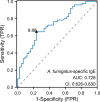High level of initial Aspergillus fumigatus-specific IgE links increased risk of exacerbation in allergic bronchopulmonary aspergillosis patients
- PMID: 40065361
- PMCID: PMC11895152
- DOI: 10.1186/s12931-025-03171-3
High level of initial Aspergillus fumigatus-specific IgE links increased risk of exacerbation in allergic bronchopulmonary aspergillosis patients
Abstract
Background: Elevated Aspergillus fumigatus (A. fumigatus)-specific Immunoglobulin E (IgE) is recognized as an essential diagnostic criterion for allergic bronchopulmonary aspergillosis (ABPA). However, it remains unknown whether initial A. fumigatus-specific IgE at acute stage has a role beyond diagnostic purposes.
Method: This two-center retrospective study enrolled 149 acute ABPA patients. Risk factors for one-year exacerbation were analyzed using univariate and multivariate logistic regression. Participants were then divided into a discovery cohort (n = 93) to determine the optimal initial A. fumigatus-specific IgE cut-off value via receiver operating characteristic (ROC) curve, and a validation cohort (n = 56) to confirm exacerbation differences based on this cut-off value.
Result: Multivariate logistic regression analysis revealed that female sex (odds ratio (OR) 2.44, 95% confidence interval (CI) 1.15-5.16, P = 0.020), A. fumigatus-specific IgE (OR 1.05, 95% CI 1.02-1.08, P = 0.002), and bronchiectasis (OR 3.61, 95% CI 1.07-12.21, P = 0.039) were independent risk factors for ABPA exacerbation. In the discovery cohort, the optimal initial cut-off value for A. fumigatus-specific IgE was calculated to be 9.88 kUA/L. And, the validation cohort confirmed that patients with A. fumigatus-specific IgE > 9.88 kUA/L were at higher risk of exacerbation (P = 0.005).
Conclusion: This study highlighted the prognostic utility of initial A. fumigatus-specific IgE at acute stage and found that elevated levels, especially those exceeding 9.88 kUA/L, were associated with increased risks of exacerbation in ABPA patients.
Keywords: Aspergillus fumigatus-specific IgE; Allergic bronchopulmonary aspergillosis; Exacerbation; Prognostic indicator.
© 2025. The Author(s).
Conflict of interest statement
Declarations. Ethics approval and consent to participate: This study was conducted in accordance with the principles of the Declaration of Helsinki. Ethical approval was obtained from the Ethics Committees of Shanghai Pulmonary Hospital, Tongji University (No. K18-153 and K18-167) and Zhongshan Hospital, Fudan University (No. B2019-020R and B2021-353). Informed consent was obtained from all participants. Consent for publication: Not applicable. Competing interests: The authors declare no competing interests.
Figures





References
-
- Agarwal R, et al. Prevalence of aspergillus sensitization and allergic bronchopulmonary aspergillosis in adults with bronchial asthma: a systematic review of global data. J Allergy Clin Immunol Pract. 2023;11(6):1734-1751.e3. - PubMed
-
- Agarwal R, et al. Allergic bronchopulmonary aspergillosis: review of literature and proposal of new diagnostic and classification criteria. Clin Exp Allergy. 2013;43(8):850–73. - PubMed
Publication types
MeSH terms
Substances
Grants and funding
- M2022101/Medical Research Project of Jiangsu Provincial Health Commission
- 82100055/the National Natural Science Foundation of China
- 81925001/the National Natural Science Foundation of China
- 82330070/the National Natural Science Foundation of China
- 2024ZD0522400/Noncommunicable Chronic Diseases-National Science and Technology Major Project
LinkOut - more resources
Full Text Sources

